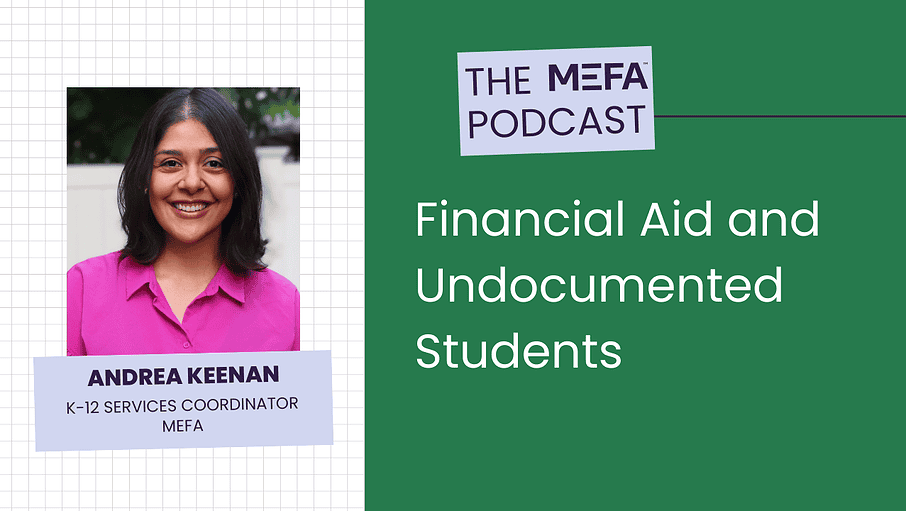

Resources Mentioned in this Episode
Jonathan Hughes: [00:00:00] Welcome to the MEFA Podcast everyone. My name is Jonathan Hughes.
Julie Shields-Rutyna: And I’m Julie Shields-Rutyna.
Jonathan Hughes: And as always, we have a great show for you today. Later on in the episode, you’re going to hear my talk on supporting undocumented students with Andrea Keenan. Who is a MEFA presenter and the Director of College and Career Counseling at Excel Academy High School. And what a great conversation we had just a few days ago. So stick around for that. But what do we have first, Julie?
Julie Shields-Rutyna: Well, another timely piece for our first segment, it’s the MEFA podcast interview with Alicia Linsey and Joe DiCarlo. So their representatives from NCAC, Boston National College Fair. NACAC, the National Association of College Admissions Counseling.
And they spoke with Jonathan about what’s [00:01:00] happening with the NCAC, Boston College Fair happening in the first week of May. And if you’re in any phase of the college search and are in the Boston area, you should check it out. So, but we’ll hear more from Alicia and Joe on it.
Jonathan Hughes: All right. Let’s go to it.
Alicia Linsey is the assistant principal at Andover High School and Joe DiCarlo is the Dean of Enrollment and Director of Admissions at Worcester State University. They’re here today as representatives of NCAC, the National Association of College Admissions Counseling and that’s a member organization that advocates for and supports admissions counselors and students and sponsors.
The NCAC College Fair returning in person this year. Joe and Alicia, welcome to the MEFA Podcast and thank you for being here.
Alicia Linsey: Thank you for having us, Jonathan.
Joseph DiCarlo: Yes. Thanks for having us. Glad to be here.
Jonathan Hughes: Maybe you can tell everybody what is NCAC and how do they help students and families?
Alicia Linsey: So, NCAC is a National Association for College Admissions Counseling, [00:02:00] and they have a newly articulated vision that focuses on the transformative power of post-secondary education, making it accessible for all. So there is a lot of advocacy on behalf of members, which are both from the college and the school side. The high school side, there are student tools on the website, and there’s a lot of collaboration between membership and families, which the national college fairs both virtual and in person are the.
Joseph DiCarlo: Yeah, I mean, I would just add that, you know, it’s membership is made up of college admission professionals, which I would be a part of, and secondary school professionals, which Alicia would be, would be part of. And we really come together as an organization to provide service but also a strong sense of professional development.
And then also, you know, working towards this ultimate goal of just making post-secondary education accessible to as many students as possible. And that’s really where our role as co-chairs of this college fair, kind of helped to [00:03:00] meet that mission.
Jonathan Hughes: So tell me about the fair.
Alicia Linsey: So the fair this year is May 2nd and 3rd as you announced. It’s back in person, which we’re thrilled to be in person. It’s at the Boston Convention Center on May 2nd, there are two sessions. There’s a session from 9:00 AM to 12 noon, and then there is a second session from 6:00 PM to 8:30 PM The second day of the fair, there’s one session from nine to noon when students arrive, they will be greeted by our committee. They will see a college advising table right at the center, which is staffed with professional school counselors from the high school side. There are also a number of financial aid experts in the advising center. There are more than 400 colleges typically at the Boston Fair, from across the country.
That’s one of the benefits is it’s not just New England based, it’s across the country, and the Boston Fair usually sees [00:04:00] 10 to 12,000 students over those three sessions.
Jonathan Hughes: I know how, huge it is and that can be overwhelming, right. For students coming in. What would you recommend that a student who is attending the fair do to prepare so that they can sort of make the most of their time there?
Alicia Linsey: So a college fair is a one stop shop. So there are a lot of opportunities for students at the fair, and I think the best way to prepare for the fair is to plan ahead. So I would recommend for my students first to go on the NACAC website and look to see which colleges will be at the Boston Fair and design a game plan so they can print out a list of which colleges are attending.
We will have maps on site, and I encourage them to bring a highlighter and literally map out a plan of which schools they want to target while they’re at the fair. So that would be a first step. The fairs are organized [00:05:00] alphabetically. So if you come in, you know where to find a college, an insider tip is perhaps to start at the back of the alphabet where it’s less busy.
So that’s if you want to try that. So first mapping it out coming with questions, you know, to, to ask specific questions. Of the admissions reps. I think it’s important to. Prepared to also talk a little bit about yourself. If they’re asking, you know, if it’s if you have the opportunity to have a more in-depth conversation with an admissions rep to be ready to answer a couple questions that they may have for you.
There’s also opportunity to meet with. Admissions folks I mean school counseling at the advising center, and we have a number of workshops that is one of the, I believe, highlights of the Boston Fair is we always have a number of workshops for families to attend. So many times we’ll see students navigating the fair and perhaps their caregivers are [00:06:00] at the Financial Aid 101 or How to Apply to College workshops. So we have four workshops per session.
Jonathan Hughes: And Joe, do you have anything to add to that?
Joseph DiCarlo: Don’t be afraid to ask for help. Our, in our role as volunteers, we are there to help not only the you know, the colleges make sure that they have what they need to be, you know, to have a nice experience at the fair, but we’re also there.
As a friendly face to help families find and get in direct wherever they need to go, whether it’s to find a particular college or whether it’s to find the restrooms. So there’s plenty of people there to to help who are, who are eager to make sure that the students are, are able to have a positive experience.
And just to highlight, you know, I’m glad that mention that Alicia mentioned the Sessions and just to highlight a few of the topics that we’re, that we’re planning to offer sessions around how to making the most of your college search sessions around what colleges look for in applications, a financial aid session, which was previously mentioned, and then also a session that’s focusing on students writing their college essays.
Jonathan Hughes: This is also, you know, a good way to demonstrate interest for students right [00:07:00] to, to have conversations with admissions representatives from colleges. Is, that right?
Joseph DiCarlo: You know, part of this process is certainly the students being able to go up to a table, interact with a college representative, gather information. There is the opportunity for a student to provide that, that that college or university with their contact information, nice way to get added to their invitation list. NACAC makes it very easy. Students don’t have to physically fill out a card with a pen and paper. They have the ability to sign up ahead of time and register to get a QR code so that that can just be scanned by the college representatives. And then you know, the, the student’s information is sent to the, to the colleges so that then they can be easily added to invitation list and, and, whatnot in the future. And so some schools, some colleges do track the number of times or interactions that a student will have.
With a, you know, with an admissions counselor, whether it be in a college fair setting, at a high school visit, or, an on-campus visit as well. So how that information is used is going to vary from school to school. But you know, any, any admissions professional is going to say they or counselor is going to [00:08:00] say, they certainly welcome the opportunity to meet with students, gather their information so that they can make that connection.
Jonathan Hughes: If folks are interested, they hear you and they want to attend the fair, where can they get information about?
Alicia Linsey: Right on the NACAC website, www.nacacnet.org, and there are a number of fairs that NCAC hosts across the country. So you’re looking for the Boston Fair.
Jonathan Hughes: Any last words of advice for, any students or any parents who may be listening to this? You know, after the fair has ended, so maybe they’re, they’re hearing this episode later on.
Alicia Linsey: I tell my students that the college admissions reps are their advocate and support on the at colleges, just like they’re used to working with their school counselor. We, again, work very closely, and so I would encourage students if they do have specific questions about a college that can’t be answered off the website or on social media, or they left after a visit or after the fair, to look on the college website to see who the admissions rep [00:09:00] is for that area and email them directly. They love connecting with students and that they’re really their best.
Joseph DiCarlo: What Alicia said was perfect. You know, we, we are just here to help. It can be an incredibly exciting opportunity in time. It can also be a bit overwhelming, right? There’s lots of options out there. You know, there’s, there’s lots of colleges and universities and, you know, a good, a good percentage of them are going to be at the Boston you know, National College Fair. And so I think for sometimes, especially if you’re the first in your family that’s going through this process, it can be really overwhelming. But students just need to know that they will eventually narrow down those options. They will develop a list and they ultimately will end up finding a college that’s going to be a great, a great fit for them.
And there’s a lot of support that they have within their community with the colleges that they’re working with, with their school counselors, with family and friends that are going to help guide them through to to find that school.
Alicia Linsey: One thing that I would challenge all students who visit the Boston College Fair is to come in with a list of schools that you’re interested in. Seek some schools that you’ve never heard of and explore options and possibilities that you are less familiar with. You [00:10:00] may just find that that’s the best fit for you.
Jonathan Hughes: That’s May 2nd and 3rd, the Boston NCAC Fair. Thank you for coming on.
Alicia Linsey: Thanks so much for having us, Jon.
Joseph DiCarlo: Thanks for having us.
Okay.
Jonathan Hughes: Thanks to Joe and Alicia for their time and once again, check the show notes for information on the NCAC Boston College Fair. And now it’s time for the MEFA Mailbag. These are questions that have come into us over the past couple of weeks and been answered by our college planning team. And remember, if you have any questions, you can email us at [email protected] or you can call us at 800-449-MEFA and of course, you can also reach us over social media on Facebook, that’s @MefaMa, on Twitter @MEFATweets, and Instagram at MEFA_MA, our question today comes to us. From a customer who writes, I’m an adoptive parent of a child from the foster care system in Massachusetts, it’s my understanding that there are tuition and fee waivers available for [00:11:00] children adopted from DCF. Would you be able to point me in the right direction, Julie? Are we able to do that?
Julie Shields-Rutyna: Yes, we are. So a great resource for this family and for this student is the DCF the Department of Children and Families. And that’s within the Massachusetts Office of Higher Education. So a couple of notes: first the student should complete the FAFSA and make sure to answer yes to the question if this is true. At any time since you turned 13, were your parents deceased? Were you in foster care or a dependent of, or ward of the court? So check that box because that allows you as the student to apply for financial aid on your own as an independent student.
And then all of the all of the financial aid that’s available, you know, federal, state, and from the college will, you know, will be available to you. So, you want to do that. That’s [00:12:00] number. And then secondly, you want to check with that, that office that I just mentioned, and we will put the link in the show notes because there are some special other grants.
There’s the Foster Child Tuition Waiver and fee assistance program that really will cover tuition and fees at any public college or university in Massachusetts. But additionally, there’s the Foster Child Grant. And there’s the education and training voucher program. So there are a number of programs, and so I would just encourage you to research all of those. Talk with someone at the Department of Children and Families, and make sure you answer that question correctly on the FAFSA.
Jonathan Hughes: Thank you so much, Julie. One more time. If you have any questions, you can email us [email protected]. You can call us at 800-449-MEFA. Our Facebook is @MEFAMA, twitter @MEFATweets, and Instagram @MEFA_MA.
Now let’s go to my [00:13:00] conversation on supporting undocumented students with Excel Academy’s, Director of College and Career Counseling, Andrea Keenan, enjoy.
Since 2017. Andrea Keenan has been the Director of College and Career Counseling at Excel Academy High. Prior to Excel, Andrea worked as a bilingual education advisor at the ASA College Planning Center in Boston, and she’s also a MEFA Ambassador offering her expertise in Spanish and in English.
So she’s a very important part of the MEFA community, and I’m very, very glad that she’s here to talk to us about this. Very important. Supporting undocumented students. Andrea Keenan, welcome to the MEFA Podcast.
Andrea Keenan: Thank you, Jonathan. Thanks for having me. I’m so excited to be here.
Jonathan Hughes: Yeah, we’re excited that you’re here. So in watching your webinar in preparation for this, which we will post to in the, in the show notes, so if people want a little bit more information, they can go and, and watch the webinar. I, was struck by [00:14:00] you. The inclusion of your personal experience there, and I was wondering if you would be comfortable sharing a little bit of that experience in growing up and how this relates to this topic.
Andrea Keenan: Yeah, absolutely. Yes. I hope everyone gets to watch the webinar. And I, like you said, I mentioned a little bit of this. I, I just believe it’s so important to share my own story when I’m working. With families and students because I have gone through so much of what they’ve gone through, I am no longer undocumented.
I’m a citizen. I was naturalized a citizen several years ago. So I’m currently what I consider an ally in, in the community, but I. Lived through the immigration process. So I immigrated to Boston from Mexico when I was very young. I think I was four or five with a visa, with a tourist visa. And as you might know, visas don’t last for a very long time.
And so. There was a possibility of overstaying the visa, and I don’t [00:15:00] actually remember the nitty gritty of the timing of it all, but what I can tell you having lived it, is that it is scary and very uncertain. Sort of living with this identity that you don’t really know a lot about when you’re young. But as you get older, you start to learn more about this identity.
Through, I won’t get through the nitty or I won’t go through all of the details of my immigration status, but through a very through very fortunate events, sort of a series of events, I was able to get my green card and then become a citizen. But throughout my life you know, Wasn’t born here, obviously, but I lived, I’ve lived the majority of my life in the us It was sort of all about me blending in, you know, going about my business, doing the best I could at school, in college, first gen, college student.
And so living my life sort of blending in. And it wasn’t until 2012. As you mentioned in my bio, I was a college advisor in Boston that I began working with Spanish speaking. And it was around 2012 when DACA [00:16:00] first became an executive action that families started asking me for help in applying for DACA.
And I sort of had a moment of, wow, this could have been me. What am I doing here? You know, like, I need to be helping, I need to be with my community, actually trying to help people navigate this because it is so confusing and so hard. And so that’s sort of over the last decade, led me on a path of a lot of self-discovery, a lot of self-education because I am not an immigration attorney.
But I’m a counselor and I am faced with families and students every day. And so I feel like I can carve out a way to, to help those in my community.
Jonathan Hughes: So let’s start with the big question that you addressed for undocumented students, which is basically, can I go to college?
Andrea Keenan: Yes, yes, yes, yes. I, you know, I repeat this over and over again, but somehow, you know, when you are in that position where there’s so much uncertainty about even just being able to reside in the US [00:17:00] that somehow I tell students this and it doesn’t always land or register or have to repeat it and really reassure them, yes, you can.
I’ll help you apply. There’s no federal law that prohibits their application to college in the us but the question often becomes, how do I pay for it? And that’s really where we get into the nitty gritty of being creative, of trying to apply for different scholarships for really using a strategy throughout their process.
Jonathan Hughes: You go over not just information for undocumented students, but also for international students in general. Right. So can you explain a little. The difference between those groups and what are the hurdles that that sort of each one has to deal with?
Andrea Keenan: Yeah, definitely. And I think as, as context, I always tell my families and students that there’s sort of three layers of things we need to consider as we’re navigating this and encourage any families, students listening, or counselors even to sort of.
[00:18:00] Use a similar frame. There’s of course the federal law, federal policy. There’s state law, state policies, then there’s that hyper local action that’s happening, whether it’s in your city or in your school. And so as you’re navigating this process, understanding those three layers, understanding.
Interact with each other and how you can leverage those three layers are really important. And so within that hyper-local context, sort of that baseline layer before you get to the state or federal level, there’s also the institutional layer where different colleges have different ways of viewing this population.
And so, this is why it gets so tricky, because if you’re alone as a student trying to navigate this, sometimes you don’t have someone that can tell you, Hey, you should try calling the college and, and ask questions. Or you could, you should try checking out their website. There’s a particular section on undocumented or DACA students.
Most students don’t really know that [00:19:00] as they’re un entering the process. But generally speaking, every year I see this evolution in how colleges interact. And view undocumented students. If you had asked me this question 10 years ago, it would, it, it was a very different answer than what it is now. 10 years ago, I would say most of my undocumented students were being treated as international students for financial aid.
And domestic students for admissions. And so what that often meant was less financial aid, less institutional aid for them. What I’ve seen as a counselor kind of on the ground is that recently, Colleges have started to acquire different verbiage when it comes to helping undocumented students. I am seeing them treated less and less like international students.
So there’s really that separation of, oh, you’ve been to high school in the US for four years. You’ve gone through the curriculum. You are a domestic [00:20:00] student for admissions, and we’ve done. We’ve had some fundraising efforts or advocacy efforts on our own campus that have sort of opened our eyes to the fact that, yeah, you also should receive some institutional aid. So here you go. You might not be eligible for the FAFSA, but there is some merit aid that you can qualify for. Whereas a true international student might be someone who lives in another country that’s going to right, come in and apply for an F1 or J1 Visa. Or an M1 Visa if they’re doing, you know, maybe a scholar’s program or something.
And so I’m seeing more and more, especially in the Boston area a true separation of those two groups, which as a counselor working with domestic high school students, I’m really pleased with.
Jonathan Hughes: If, you could guess, what do you think is behind that transition?
Andrea Keenan: I think it’s local, like grassroots advocacy and some, some real strides being made with some [00:21:00] really I think the movement of dreamers and everything that’s been in the news the last five years, I think people are starting to open, really open up their ears and eyes to, this population.
I mean, I, I heard someone once at UMass Boston, I think they’re a part of the student immigrant group. Refer to this movement as a movement of storytelling. And there’s an undeniable power in that when you have five, 10 undocumented students on your campus, and then next year you, you have 20, next year you have 50.
You know, suddenly you have. A hundred undocumented students on your campus, they’re going to start sharing their stories, they’re going to touch people. And so a lot of the progress I’ve seen, I’ve actually seen at that like local campus level and slowly starting to trickle up to say like the city level.
And I can talk a little bit more about some of those things I’ve seen. Yeah, go ahead. So for example, something I’m currently really excited about is the city of Boston. It’s a huge city of [00:22:00] Boston initiative. And maybe you’ve heard about this, Jonathan, but beginning in the fall, 2023, the City of Boston is expanding eligibility for the tuition free community college program.
And it’s going to include all Boston residents regardless of age, income, and immigration status. I mean, the fact that that has happened, a year or two into this program, I think shows that like steady. Progress and the power of advocacy because people many, many undocumented students graduating from high school every year weren’t able to qualify for that and wanted access to that.
And I think it’s great that, for example, the city of Boston is kind of paving the way for that. And I’ve, that’s what I’ve seen. I guess that’s what I’m talking about in the last decade, is just like, Slow progress people advocating. Counselors also have a huge power and responsibility to add to their voice. So good things are happening.
Jonathan Hughes: Can you explain sort of the emotional aspect of students who may be afraid to disclose their [00:23:00] status and, and what are some of the things to think about around that?
Andrea Keenan: Yeah, definitely. This is actually what my work has centered around at my own school, and I’m very lucky to have had administrators who have sort of let me pilot certain initiatives at our school because it really is an invisible identity.
Like many others out there, you can’t tell a person’s undocumented sometimes by what they say or how they act around certain scenarios. You can tell potentially a, there’s something there with a student, but you can’t ask them. And that’s what’s hard. And it’s illegal to ask a student in their immigration status in a school or organization and.
That is what leads to this culture of secrecy is sometimes I refer to it because obviously it’s very sensitive. And so when caring educators want to care for students, they want to respect that it’s sensitive, right? And they don’t want to talk about it. And obviously, that’s doing the right thing.
[00:24:00] But I, what I find especially in schools is that, sometimes we overcompensate and we really don’t talk about it. It really becomes this like secret. We think there’s something going on with that student, but we don’t want to pry. And it just kind of snowballs because it comes from a place of care. And what I actually try to talk to a lot of.
Counselors or administrators about is actually shifting that narrative. And actually, the more we talk about our t undocumented population, the freer, the safer they’re going to feel to actually ask for help when they need it. No one goes around. I didn’t go around sharing my immigration status with even my friends.
Some, I don’t know if some of them will listen to this podcast and probably be surprised I was dealing with this in high school. You don’t go around doing that. But what you do go around doing is listening and watching for clues and signals of who and what spaces might be safer for you. And I remember navigating my high school.[00:25:00]
It was sort of a suburban, large high school here in Massachusetts and not one seeing come talk to me if I’m, this is an undocu friendly space. Even my counselor’s office, you know, you often see the butterfly symbols now. Nothing. No one talked about this. And so what I’m trying to shift at my school and, and hope that other counselors who have seen webinars about this and trained and gotten trained on this, is that the more.
You say outwardly, we’re undocu friendly. We’re safe. Your information’s safe. The more that when a student does have a question, they’ll go to you and they’ll ask and they’ll self-disclose and say, Hey, Ms. Or Mr. I have a question about this, can you help me? And the adult might not know all the answers, but at least the adult can hold the student in that moment and help them find the answers.
And so that culture of trust, I think yes, is like built in the, in those like one to one [00:26:00] moments. Of course, students get very comfortable with teachers and adults in their lives, but it’s also built on that like macro level of as a school, are we sending out signals that we’re welcome.
Jonathan Hughes: Hmm. You mentioned butterfly symbols I didn’t know that that was a symbol for undocumented. Is that something that is sort of to let undocumented students know that they’re okay to talk about their, their issues in your office or, yeah.
Andrea Keenan: Yeah. Thanks for asking that. I personally love butterflies and the symbolism they carry. Many years ago artists in the undocumented community and allies and activists sort of started using. The monarch butterfly or the butterfly in general as a symbol. And so I think it’s slowly become somewhat of, of the symbol for dreamers. And the immigration movement, I don’t think it’s, I think I don’t think it’s as widespread yet, but it’s definitely something that if you know, you know and our [00:27:00] immigration group, for example, at my school, uses the butterfly as a symbol and many other groups do.
Jonathan Hughes: You mentioned, obviously counselor’s office as a resource. What are some other resources for students that might be in this sort of vulnerable position and, and how would you counsel someone who is maybe in afraid to ask for help?
Andrea Keenan: I find that there’s usually one or two adults in every organization that maybe have lived through something like this or have family that have lived through something like this.
So that’s why it’s so important to send out those signals, right? Because you might be that person in your organization that students might flock to. So if students know about humans in their spaces, that can help. I think that’s the first piece. But really want to also empower. Students and families to seek out their own information and to really be reading and connecting themselves and to organizations that are doing work for them and with them in their communities.
And so, for [00:28:00] example, in the Boston area, we have, or have had for a very long time, the student immigration movement. I think they might be changing their name to stories. Something stories in immigration, but the SIM, right, the Student Immigration Movement, they do a lot of community organizing and community building for and with built by UN the undocumented student population in Boston.
Also United We DREAM, sort of the largest network of for buy and for undocumented students bookmarking these pages, reading updates, go getting on their Facebook pages. They’re constantly posting updates on DACA. This just happened and on the Supreme Court level, this is what you need to know if you have DACA or this is where you can get access to funds if you need help reapplying for, for your DACA.
And so getting connected to those organizations, if you are a practitioner who wants to help but doesn’t know how, I [00:29:00] encourage you to just bookmark, for example. What’s it called? Immigrants Rising is an organization. I have that bookmark, right? Because I’m not an immigration lawyer.
I need to say current on, issues and things are happening, so I have that page bookmarked. Families can have that page bookmark our resources like the ones you offer at MEFA, you know, my webinar and other articles and blog. All of that just starts to create an ecosystem of information for a family. And so even if they’re not connected to someone at their school that can help them, there’s always resources out there sort of floating and just being able to plug into those. I have the immigrant legal resource center is also another plug for them. Bookmark that I always keep up as a practitioner, but I have even some families that, that get on there and get updates that way. So I don’t know if that answered your question, Jonathan, but I think about knowing where to look and just staying plugged in to, to those feeds.
Jonathan Hughes: You [00:30:00] know, I know at MEFA we- part of our college financing presentations, as you know, they talk about the different avenues of financial aid and, and where it may come from. And so I’ll just mention one and you tell me if this is available to undocumented students or not. So the first one is the federal government is the or, or undocumented immigrants eligible for federal aid.
They’re not the second one being state aid. And I wonder if you could talk about the different levels. Of support that are available among the states?
Andrea Keenan: Sure. Yeah. Every state does this differently. So I encourage everyone to do their due diligence and see what is available at their state level. There are some states that give financial aid.
Two undocumented individuals via State Dream Act, their own sort of state legislation that allows that for public campuses to give aid to students. And so I guess I want to back up for a moment and just clarify. Sure. There’s [00:31:00] a difference between a public campus and a private campus, right?
And so when we often talk. State aid. What we’re really trying to get at is what’s happening on those public state campuses, and so that’s a lot of where some of the states have really upped their game in terms of legislation to say, all right, at our public campuses, we are going to have a separate financial aid form that undocumented students who have gone through high school in our state can fill out and then therefore get.
From, from the state to fund their education at these public campuses. And so if you’re listening from Massachusetts, for example, we don’t have that yet. And, and again, this is where I encourage all of us to plug in and, and say, Hey, how can we advocate? For this at our state because it’s a game changer.
It changes lives. $5- $6,000 a year can change lives, which is why I mentioned the City of Boston initiative for tuition free community college. That has already changed two or [00:32:00] three of my students’ lives. Wow. And so that’s only available at four or five campuses? Five, six. Don’t quote me on that.
Well, that’s only a few campuses in Massachusetts, but that’s a, an example of state level aid for for campuses in Massachusetts or in some other states, there might not be that top tier of aid for undocumented students, but there might be, say, in-state tuition benefits for work permit holders or for DACA holders or hold, you know, holders of that employment authorization card, whether it’s TPS temporary protective status, DACA, or some sort of other status that’s in the works where the beneficiary does receive that work employment authorization.
And so, campuses ask for different things in order to validate that, to give you those in-state tuition benefits. Most of them, for example, in Massachusetts, ask for proof of that given to their admissions office in [00:33:00] order for that in-state tuition benefit to kick in. And so that’s sort of another layer of that.
That is really great because there are a lot of TPS that employment authorization holders that want to go to college that don’t have a green card yet, a permit resident card and can’t file the FAFSA. So again, these small things change lives. The population that loses out on, on those sort of in-state benefits for work employment authorization holders are the undocumented, the fully undocumented population.
They’re the ones losing out on, on those benefits unfortunately. And so, yeah, it, those are sort of the two tiers. And then there’s state level grants and scholarships that are only elig are only available for those students filling out FAFSA. So it’s, really kind of not a huge amount of benefits out there if you’re fully undocumented.
Jonathan Hughes: In, in some states, so we’ve, got [00:34:00] federal, we’ve got state, and then finally the colleges. There are different levels of support that, that various colleges would give you know, undocumented individuals of varying statuses.
Andrea Keenan: Yes. I think it, this is a question that I often talk about with any student, regardless of their immigration status, because policies at private colleges, do differ so much.
As you know, there are colleges that meet a hundred percent of fully demonstrated need, regardless of, of status or regard, you know, and so that’s great. But then you have other colleges that give out tremendous amounts of merit aid. And so it’s kind of, at the baseline, understanding how a particular college is going to interact with you as a student.
And we talked a little bit about domestic, international. What I’m finding, and again, we, I think we talked about this in the first question, is a lot of colleges starting to [00:35:00] consider undocumented individuals, domestic also for financial aid, right? Because there’s been advocacy and there’s money there, and so merit aid can be given to undocumented individuals at, at many colleges. So it really does depend on how that college is viewing the undocumented student and, and also seeing what those, that cost of attendance is total, because as you know, it’s. At a private college can be really, really high. And so even with a substantial merit aid scholarship, without those federal funds, without those state funds to kind of fill those gaps, it could still be a hard thing for them to achieve.
Jonathan Hughes: Do you have any tips on how some of these students would go about finding out what kind of support is available for them at these colleges?
Andrea Keenan: Yeah, I, I think If a high school student is working with their [00:36:00] counselor, much like any, any student of any population, you know, we always tell our students, stay organized, right?
Make your list out. Here’s a list of colleges that I might suggest that I know are particularly undocu-friendly, or that students in the, in the past, at my school that were undocumented, have applied to and, and gotten decent aid. So I might baseline suggest schools to them as a starting off point.
And then always say, stay organized. You know, keep notes written for every college. Share them with me, let me know what you find. And so I think for this population in particular, staying organized is so important. Because having a central place where we’re collecting information, how say I tell a student, okay, you call these two, I’ll call these two.
We’ll try to fact find, having a central place where we’re keeping our notes will allow me to be able to debrief with them better because they might, let’s say, call a college to fact find, may get someone on the phone that doesn’t [00:37:00] know a lot, that might be tactless and might say something the wrong way.
And that just ruined the student’s whole day, right? Because they’re already so vulnerable, they’re putting themselves out there. And so for me to be able to say, let’s debrief what happened, tell me about the call, what, and then help them make meaning of those fact finding missions is really important.
And so having that adult around that can, can do that. And so what I often tell students is, let’s start by looking at their website. What’s actually on their financial aid page? What are they actually telling us? A lot of private colleges these days do have a separate sort of subsection for undocumented and DACA students, which is phenomenal.
Again, some of the changes that have been occurring the last few years, and so we’ll fact find there. First, I’ll give them the intel that I know about the colleges and if they’re still lingering questions, we will call the financial aid office. [00:38:00] I will. Take the lead sometimes on those calls because there, there might be a more intricate question we need to ask, but I’ll have the student sitting down next to me when we call and ask.
So very, very rarely do I send a student out on fact finding calls right off the bat. There’s something that we do after we’ve already done some of the initial research, if they’re local colleges. I might already know the answer to a lot of these questions, but it’s mostly if there are. There are schools on a student’s list that are maybe out of state or that I might be less familiar about than we have to do this extra layer of fact finding.
But I usually frame that as this is what your peers are doing too, right? We’re trying to find good fits for you. This is just an extra added layer for you just doing our due diligence.
Jonathan Hughes: You talked about, you know, you may just have to get creative as an undocumented individual, so can you give me an example and, and how to pay it for college? Can you give me an example of what that [00:39:00] might be?
Andrea Keenan: Oh gosh, yes. Talking points are so important especially as you’re talking to a family for the first time and gaining their trust and trying to position yourself as an ally in their process. And I always tell families that we are going to get creative and we’re going to find ways to do this. And so the first way is obviously having students apply to private scholarships, but I don’t ever want to put a lot of false hope in private scholarships because they can be hit or miss as you know. I think the most creative we ever got. Was a student, had cousins that lived in Florida and. The student wanted to work for a year, save money, and then apply to college.
And so the student thought, wow, well, my cousins live in Florida. They’re paying a little bit less than I would pay here for a two year college. I’m going to go down there, work for a year. Establish my residency, use that support my work I have down there and pay a lot less money. Of course that’s like a [00:40:00] really sort of creative solution to an issue.
More common scenarios are starting at two year colleges and transferring over to four year and really framing that for families starting off. Potentially online doing a certificate there, then transferring. There are two year colleges here in Massachusetts. They’re not public that have the same tuition rate for both for both types of student, right?
Documented or undocumented. Everyone pays the same amount. And so something like that, doing that for two years, then transferring. A lot of career conversations, Jonathan, of saying, what are you passionate about? Like what do you actually love to do? What would your ideal career be? And then let’s work backwards.
You might not need a four year degree though obviously four year degrees are awesome, and if a student truly wants that, I’m going to fight with them for that. But if a student wants to be. A coder, a graphic designer there are shorter degrees that [00:41:00] can get them a lot of really good credentials to then start their own business, be an independent contractor.
Undocumented individuals can own businesses, can own property, can work for themselves. And so sometimes it’s just helping the student think outside the box a little bit, allow themselves to dream. So. Undocumented students don’t really dream because they think my options are limited. I’ve got to take what I can get.
And pushing them on that and saying, what do you actually want to do? What are you really good at? The money will come, and I’ve been doing this for about 10 years and I’ve seen that play out over and over again. A student saying, do I follow my dream and become a graphic designer, or do I just keep working at this restaurant that I’m already working at?
And when I encourage or they encourage themselves to follow their dream, the money may not be there the first two, three years, but if there’s passion there and they start their own business, they word of mouth, they get clientele. They can build a really great life for themselves doing what they love.[00:42:00]
And more so than saying, yes, you can go to college, it’s also saying, yes, you can build a life that you want for yourself.
Jonathan Hughes: Do you have any final words of for undocumented students?
Andrea Keenan: I do and I think, I don’t want it to sound cheesy, but I want them to know they’re not alone. It’s an isolating, invisible identity.
You think you’re on your own because you don’t talk to people about it. You don’t want to. You want to obviously keep you and your family safe, and you don’t want to divulge your legal status. And that often leads to you feeling well, I’m the only one, then I’m alone. That offend for myself. And I really want them to know that there are so many other students going through the same thing out there.
And if you can be a little brave, seek out groups, seek out a fellow undocumented college students try to get connected to, to those communities. It can be really powerful to share your experiences with them. They can share their experiences with [00:43:00] you and it just demystifies that and makes you feel like you’re not alone.
And their strength in numbers, their strength and storytelling. And so there, there are a lot of groups out there. You just have to seek them out. You’re not alone.
Jonathan Hughes: Well, Andrea, thank you so much for being here. Will you come back? Yes, please. Thank you. I learned a lot. I had a great time during this conversation.
Andrea Keenan: Thank you so much for having me. This is really great. Hope a lot of people can, can take nuggets from this.
Jonathan Hughes: All right folks. Well, that about wraps it up. I want to thank Andrea Keenan for being here and offering her experience and her expertise. And folks, have you liked what you heard on the show today?
And you want to know more from us about planning, saving, and paying for college and career readiness, as well as reaching financial goals. You can follow us on Apple. Podcast, Spotify, Stitcher, wherever you get your podcast. And please remember to review us. It helps us to do what we do and keep getting this show out in front of people like you. Julie, [00:44:00] thank you once again.
Julie Shields-Rutyna: Jonathan. Thank you.
Also thank you to Shaun Connolly, our producer, thank you to AJ Yee for his assistance in posting the show. And once again, my name is Jonathan Hughes and this has been podcast. Thank you.












